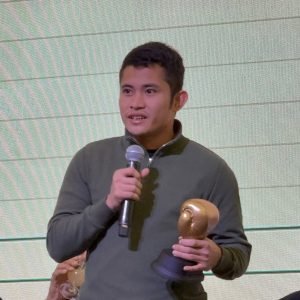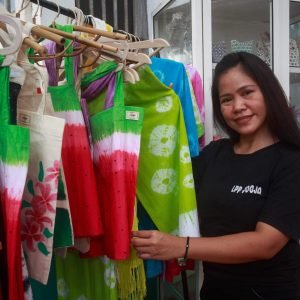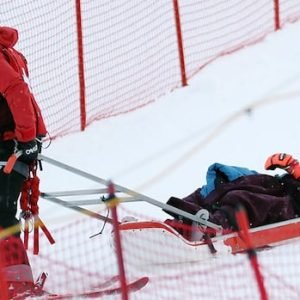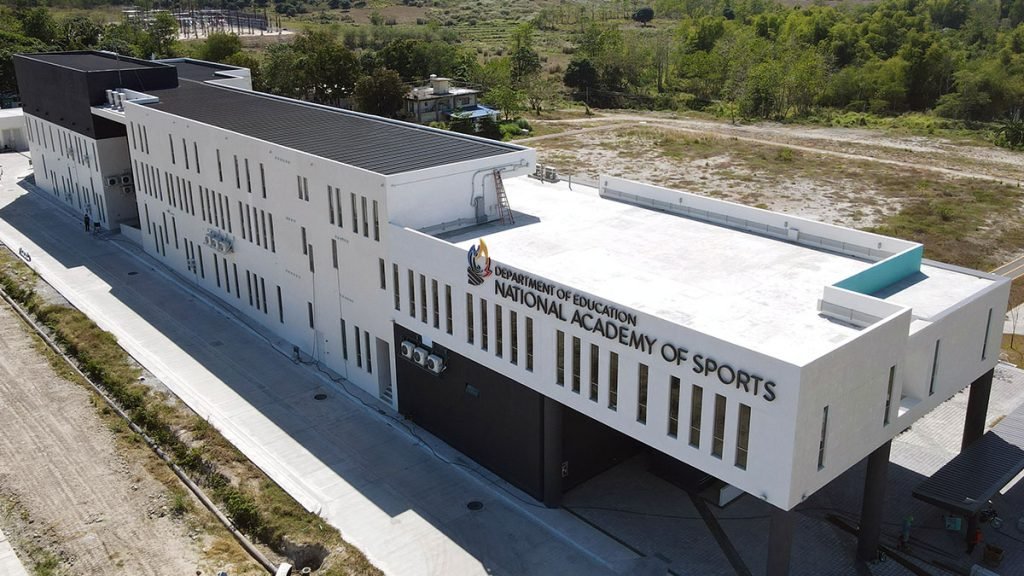
A group of civil engineers armed with steely resolve formed the backbone of a homegrown company that has become a key player and significant innovator in the local roofing industry.
Rey Batomalaque, Noel Pablito Gregore, Ariel Chavez, Wilson Guado and Mario Dennis Lumpay—all from working-class families—trace their roots as employees of Jacinto Iron and Steel Sheets Corp. Batomalaque was in research and development, while the others were in sales and/or engineering.
After Jacinto Steel had undergone reorganization, the group took the leap of faith and started their own roofing supply business.
Batomalaque tells the Inquirer that when they were about to register at the Securities and Exchange Commission, it was a challenge even just to raise the paid-up capital. “We all had to make cash advances from our credit card amounting to P10,000,” he recalls. Originally, there were seven founders, but two later on left the company.
“I had to fill up the original incorporation papers by hand because we did not bring a typewriter. Maganda pa sulat kamay ko noon kasi siyempre engineer (Back then, I still had a good penmanship because I’m an engineer),” he says.
Article continues after this advertisement
Founded on Dec. 16, 1994, Colorsteel Systems Corp. began operations in a 24-square-meter (sq m) office in Makati, with a secretary as their first employee. They began as a trading firm, selling prepainted steel roofing.
Article continues after this advertisement
Their first customers were based in Cebu. Their clientele grew when they started to offer colored roofing with free installation services. Colorsteel eventually positioned itself as a trading company of prepainted long-span steel roofing and roof engineer services.
As a means to survive, the company catered to all types of customers—from residential to commercial and industrial markets. “Kahit doghouse nga noon ay papatulan namin (We would even put up a roof over a doghouse),” Batomalaque quips.
From trading to manufacturing
Lady Luck smiled on Colorsteel under the presidency of Fidel Ramos. Himself a civil engineer,
Mr. Ramos’ rapid growth framework spurred a construction boom, boosting Colorsteel’s growth momentum.
One of their biggest breaks came when a group of Chinese businessmen took interest. They saw the potential of Colorsteel and infused fresh capital to allow it to set up its own rollforming plant. “We agreed to form a joint venture with them. In return, we promised to become the No. 1 dealer,” Batomalaque adds.
All had gone well until the 1997 Asian financial crisis erupted. Like many other businesses with dollar-denominated debt, Colorsteel was badly hit. Eventually, the group had to part ways with the Chinese investors.
Juliet Castro-Cabatingan, president of Colorsteel, had risen from the ranks and seen the company from its fledgling phase.
After finishing her Master of Business Administration at Ateneo de Manila University (as Colorsteel scholar), she was eager to make ends meet for the company. Back then, Cabatingan held two roles: assistant general manager as well as the marketing and customer manager.

Juliet Castro-Cabatingan —CONTRIBUTED PHOTOS
To gain the financial muscle to build a new production facility, she conducted a feasibility study and convinced Metropolitan Bank and Trust Co. to grant a P3-million loan.
After getting the funds, they rented a 300-sq m warehouse in San Fernando, Pampanga, and purchased their very first Taiwan-made rollforming machine.
Batomalaque started designing their own coils and sold them in nearby areas. Luckily, the market was very receptive. With skilled craftsmanship and personalized after-sales services, they gained a foothold in the market.
Another key milestone for Colorsteel was when they bagged a contract to install the steel deck to support the flooring of Ninoy Aquino International Airport Terminal 3 when it was still under construction.
A steel deck is a “sheet of high-performance galvanized steel” used a structural feature in roof construction.
When the search began for a local subcontractor, their “solid technical expertise” allowed them to edge out other bidders, Batomalaque recounts.
To improve product design, the company purchased a metal steel deck from Taiwan for P2 million. In hindsight, this proved to be a strategic move; the machine increased their bottom line by allowing them to produce quality roofing designs.
Institutional business
These days, Colorsteel’s industrial and commercial unit deals with some of the country’s A-list companies. It has helped built structures such as Asia Brewery in Laguna, San Miguel Brewery in Cagayan de Oro, Steel Asia facility in Davao, Philippine Children’s Medical Center and shopping centers, among others.
Recently, Colorsteel was awarded the industrial roofing contract for Daniel Z. Romualdez Airport in Tacloban City. Colorsteel’s newest innovation called Seamflex — described as a “zero-leak, multi-configuration seamlock profile that can be shaped straight, tapered, curved and curved-tapered — will be utilized for the airport.
Colorsteel has now established a nationwide network of 20 sales offices and six production facilities in Cavite, Pampanga, Bacolod, Iloilo, Isabela and Davao. Another facility is underway in La Union.
The group now has 435 employees, some of whom have already been with the company for more than 25 years.
Diversification
In 2015, Colorsteel Holdings Inc. (CHI) was established by the founding directors as a culmination of a lifelong dream to offer superior customer service in steel construction.
Through CHI, Colorsteel has diversified into construction technology, steel framing through Philippine Steelframing Corp.; importation and trading of raw materials through Katana Tradegrade Inc., while CSC Transport Corp. serves as the logistics arm of the group.
In terms of business mix, Batomalaque says the residential segment is still the group’s biggest market. In return, Colorsteel aims to raise consumer awareness on the dangers of using substandard roofing materials that continue to flood the market.
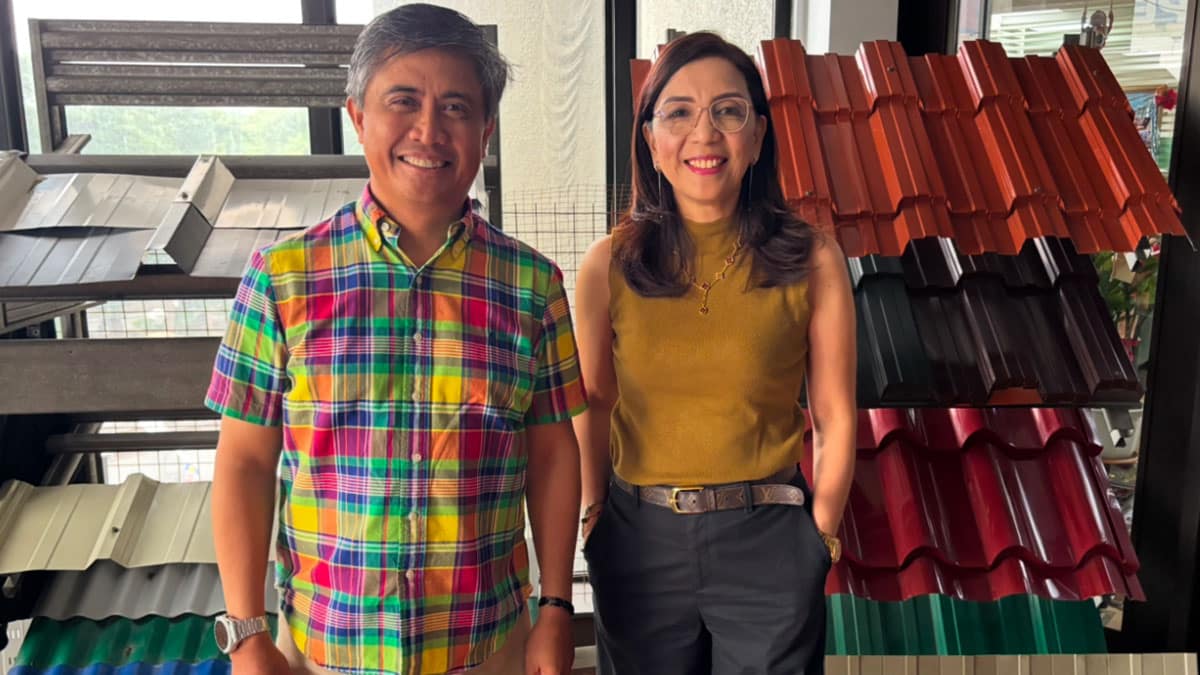
ROOFMASTERS Colorsteel founding director Rey Batomalaque and president Juliet Castro-Cabatingan demonstrate some of their roofing products. —FILE PHOTO
Unfortunately, consumers often get swayed by cheaper cost of materials. “They wouldn’t know the difference until three years later when they see the price they have to pay for repairs,” he adds.
To safeguard their innovations, Colorsteel has registered 20 trademark roof designs with the Intellectual Property Office of the Philippines, including their best-selling products such as the Terrazzes, Molave, Grandeza and Grandeur & Classic.
Three decades since inception, Colorsteel’s proposition to provide sturdy roof for every Filipino home and business still stands. The five founding directors and their employees continue to work toward the singular goal of providing quality roofing.
Quality service has paid good dividends, allowing Colorsteel to become one the largest players in the local roofing industry. Customers will always look for experts to install their roof because it is an essential part of their home or business, Batomalaque adds.
“Credibility is not an overnight issue. We worked hard for it for the last 30 years.”


